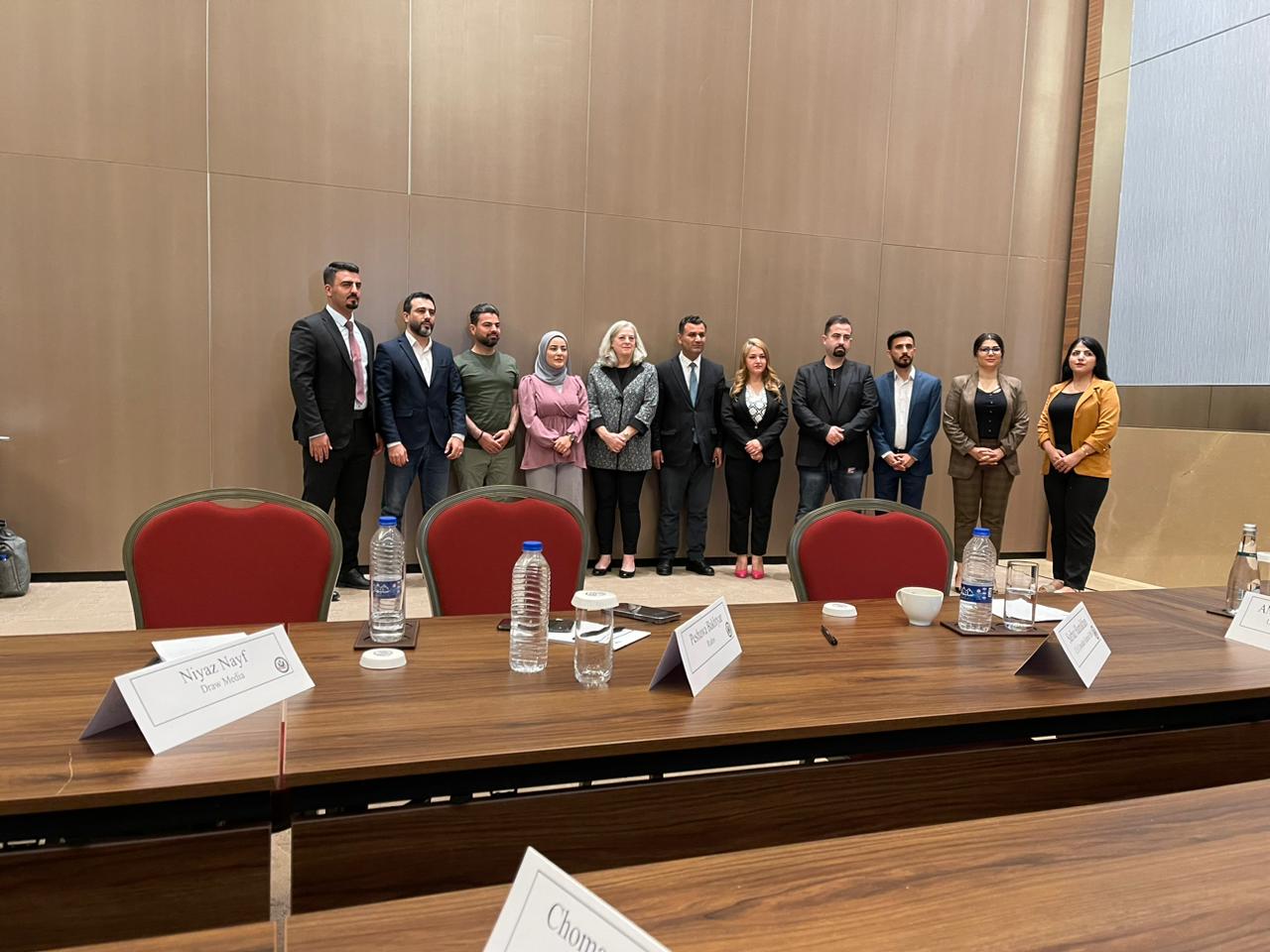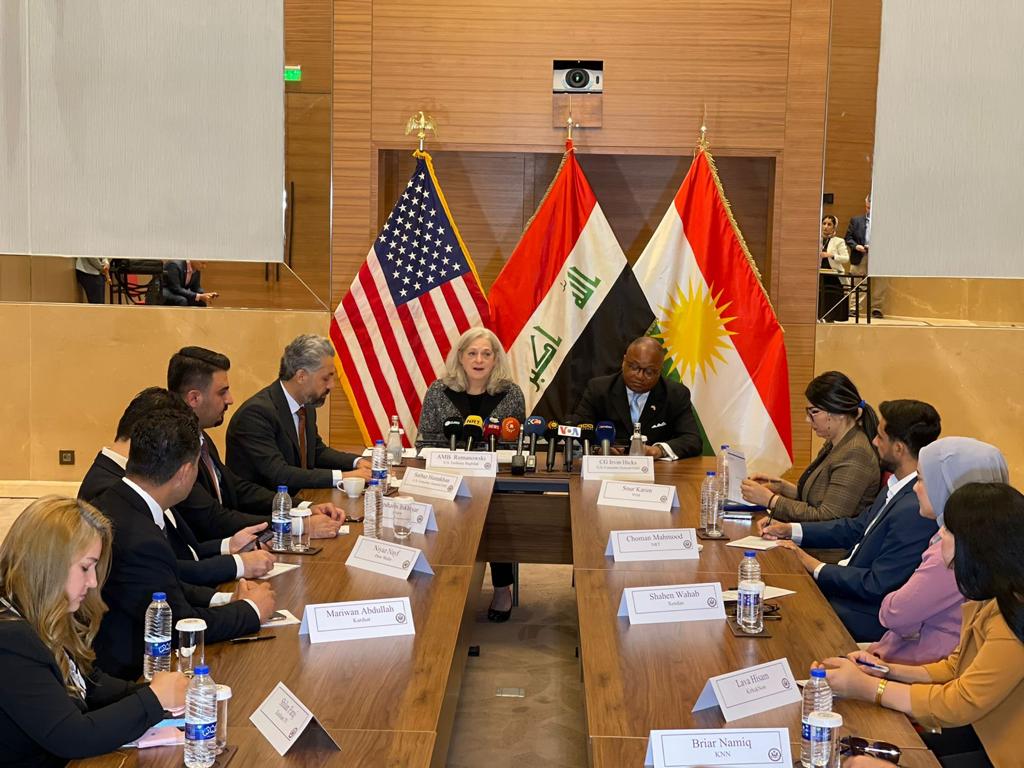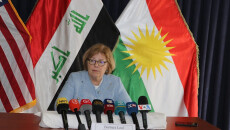The United States US Ambassador to Iraq Alina L. Romanowski says part of their discussions with the political leadership of the Iraqi Kurdistan Region IKR was focusing on the backslide in democracy which is moving in the wrong direction and the recent guidelines issued by the Kurdistan Regional Government KRG's ministry of culture contradicts in many places with the current press law.
The US ambassador to Iraq said this in response to a question from KirkukNow reporter Lava Hussam at a press conference held in Sulaymaniyah on Thursday, June 7th, 2023. KirkukNow asked about the recent guidelines by the Ministry of Culture of the Kurdistan Regional Government KRG.
There are many restrictions on freedom of expression that “I don't feel comfortable as a journalist," Hisam said.
“We have raised these issues with the political leadership about steps that have been taken to reduce media freedom, human rights, and general human rights issues," US ambassador responded.
"I haven't taken a very close look at the new guidelines I think by the ministry of culture, but I would say the current press law is a good one, and should be implemented,” she added.
"The recent guilines issued contradicts in many places with the current press law."
On May 23, Waqi'i Kurdistan, official gazette of the KRG, published several instructions of the Ministry of Culture and Youth for the media, which contained several restrictions and vague guidelines, which caused unrest among journalists who deeply criticized it through writings, seminars and meetings.
For example, the guidelines give absolute authority to the government, including the Ministry of Culture, to issue permits after obtaining the approval of both ministries of Interior and the Environment.
The provision states that if they do not respond within 90 days, the application is considered approved, but does not explain what steps can be taken if an application is rejected.
"When you look at this in the context of the runup to elections, it is very important that press freedoms are appealled, .... that there is opportunity for everyone to express their views whether they support or don't support these issues," US Ambassador added.
“We watch very closely as the government sort of restricts the freedom of the press, but also more importantly puts journalists in jail and puts pressure on journalits and that is very concerning issue for us."
Another issue of great concern to us is the arrest of journalists who are imprisoned for their profession
The local and international organizations, human rights advocates, members of the Iraqi and Kurdistan parliaments continuously express their grave concern that the journalists and the freedom of press are increasingly under threat all over Iraq including the Iraqi Kurdistan Region IKR.
“A media environment in which press outlets were closely affiliated with specific political parties and ethnic factions, an opaque judiciary, and a still-developing democratic political system combined to place considerable restrictions on freedom of expression, including the press,” said the 2021 Human rights practices in Iraq by the US department of State, published in April 2022.

US Ambassador met with the media outlets in Sulaymaniyah northern propvince, on Thursday, June 7. KirkukNow
The Metro Center for the Protection of Journalists' Rights has registered 431 violations against 301 journalists and media institutions last year while in 2021, there were 353 cases of violations against 260 journalists and media institutions.
In the procedures for obtaining a license for a package (more than one institution), the guidelines of the Ministry of Culture link the issuance of licenses to the non-objection by the Ministry of Interior.
The ministry set conditions for the quality of journalistic content, including "compliance with the standards of media content issued by the Media and Information Office," which is under the Council of Ministers and have not issued any guidelines yet.
"Avoid media activities that cause economic crisis and turmoil in domestic markets," it said, without further explanation.
In the prohibited section, the publication of any article that "distorts culture, traditions and public morality" is described as prohibited, as well as matters that "jeopardize the public interest."
“Besides, any article that causes defamation of national figures and symbols, whether confirmed by local sources or published for any foreign media reason, is prohibited.”
In October 2020, Sherwan Sherwani and four journalists and activists from Badinan were arrested and sentenced to six years in prison on February 16, 2021 by a majority of judges of the Erbil Criminal Court.
On March 16, 2023, three of the convicts in Badinan were released after completing their sentences and reducing their sentences according to a presidential decree, including (Ayaz Karam, Shivan Saeed and Hariwan Isa). However, Sherwan Sherwani and Gohdar Mohammed are still in prison and other cases have been opened against them.
Badinan detainees, few of them tried and freed up today, are victims of a wave of arrests carried out by the Kurdish security forces Asayish since June 2020 in response to a series of major protests against delay in salaries of state employees, the KRG handling of the economic crisis resulting from disputes with Baghdad over oil production, export and corruption, and reached its peak under the Covid-19 pandemic.
One of the most dangerous penalties faced by the media according to the guidelines is that if each channel has five violations within two years, it will be blacklisted by the KRG culture ministry and will not be supported for one year by the Council of Ministers and boycotted by all ministries for one year.
We believe that the issue of freedom of expression in the Kurdistan Region has gone in the wrong direction in recent years
"Part of the discussions we had, we focused on the backsliding of democracyin the IKR region, sort of moving in the wrong direction. So we do have a serious dialogue on media freedom, women's rights, gender-based violence and human rights in general," the US ambassador elaborated.
“The last point I want to make is that the government must defend the rights of the people enshrined in the constitution, because protecting these rights will ensure the protection of democracy."






